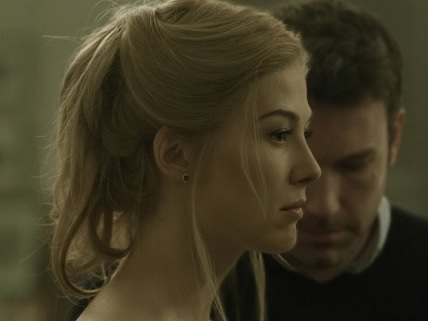Gone Girl
Ben Affleck and Rosamund Pike plumb the noir depths of a dark bestseller.


Gone Girl, David Fincher's adaptation of Gillian Flynn's knockout best-seller, has several things to recommend it. Chief among them is a world-class performance by Rosamund Pike, who plays the devious schemer Amy Dunne with an icy calculation that recalls old-school noir icons like Barbara Stanwyck and Lana Turner. Pike has been featuring in movies (The World's End, Jack Reacher) for more than a decade now, but this juicy role is, at last, her breakthrough onto the Hollywood A-list.
There's also the novel's head-spinning narrative twist, of course —an out-of-the-blue turnaround that compells readers to reevaluate everything that came before it. But it isn't until we're halfway into the book that the story blows up in our faces. In the movie—scripted by Flynn, possibly with some degree of guidance by Fincher—this crucial fakeout has been repositioned: it comes much earlier, reducing the delicious tease and leaving us to simply check off the subsequent jolts of wily deception. Which is a lot of fun. But it unbalances Flynn's original structure.
Although it's been compressed somewhat to fit into a movie (even one that runs two and a half hours), Flynn's tale of a poisoned marriage—a union of two deeply flawed protagonists—is in general faithfully rendered. And Fincher savors its dark maneuverings, while also taking aim at the hypocrisy of tabloid media and occasionally deploying his gift for creepy set-piece scenes. As problematic as some of its elements may be, the movie is never dull.
It begins in a small town in Missouri, on the morning of Nick and Amy Dunne's fifth wedding anniversary. Amy (Pike) has gone missing, and Nick (Ben Affleck) is puzzled, and soon worried (before long, mainly for himself). We get the couple's backstory from entries in Amy's diary. They met in New York, where Nick worked for a pop-culture magazine not unlike Entertainment Weekly (the publication from which Flynn herself was once laid off). Amy, a trust-fund golden girl whose parents grew wealthy off a series of children's books that cannibalized her own childhood, is lightly employed writing "personality quizzes" for women's magazines. When the bottom drops out of the economy in the mid-2000s, these two suddenly find themselves jobless—not a problem for Amy, but a withering comedown for Nick. He drags her back to the Missouri town where he grew up, opens a bar with his sarcastic twin sister Margo (Carrie Coon), and begins teaching courses in magazine writing at a local school. Amy whiles away the time with her diary and with the annual "treasure hunts" she stages for the couple's anniversaries (the rhymed "clues" for which will later prove fateful).
Amy's disappearance makes Nick a natural suspect in what may have been her murder. He doesn't seem worried at first—after all, he says, he's innocent. But two no-nonsense police officers—Rhonda Boney (Kim Dickens) and Jim Gilpin (Patrick Fugit)—are in the business of not buying it. They begin unearthing clues—traces of blood on a kitchen floor, a recently bumped-up life-insurance policy on Amy—that begin tightening a noose around her husband's neck. They also discover that he's been having an affair with a 20-something former student (Emily Ratajkowski), that he's racked up some heavy credit-card debt, and that it was Amy's money that financed his bar and the couple's tacky McMansion. Murder motives abound.
Now shaken, Nick flies to New York to obtain the services of a celebrity lawyer named Tanner Bolt (Tyler Perry), a slick legal operator whose specialty is engineering acquittals for guilty men with high tabloid profiles. Bolt is a master at manipulating the media—here represented by a Nancy Grace-like TV harridan named Ellen Abbott (Missi Pyle) and the classier Sharon Schieber (Sela Ward), an interviewer in the purring Barbara Walters mode. Nick does some investigating of his own as well, turning up one Tommy O'Hara (Scoot McNairy), who has alarming things to confide about Amy, and an old boyfriend named Desi Collings (Neil Patrick Harris), who curtly refuses to cooperate with Nick's inquiry.
By this point, we've been sandbagged by the big twist, which I won't go into. The story's he-said-she-said narrative strategy slowly brings Nick into focus as a spineless dissembler—prime meat for the vindictive Amy. Affleck may be too much of a nice-guy actor to fully incarnate a low-key weasel like Nick; but Pike's Amy, whose subtle shifts of expression radiate a bone-chilling malice, is a femme fatale for the ages. In happy addition, Dickens is especially effective in balancing sympathy and suspicion as the investigating cop, and Perry's big, hearty performance as Tanner Bolt is a revelation, demonstrating that he should start getting out of his own movies and into more like this one.
Fans of Flynn's book may be unhappy with the way that some of its characters have been diminished here, and they'll surely miss Amy's bitter rant about "cool girls"—the type of women who configure themselves to be everything that kinky, self-absorbed guys could want. ("Men actually think this girl exists," Amy says in the novel.) And some of the book's shortcomings remain unchanged. The story's culminating event is as unpersuasive as ever—it comes about only because the plot requires it to do so. And its anticlimactic ending, although artfully tweaked here, is still a bit of a letdown.
Fincher whips the story along in virtuoso fashion, though. There's a memorable bloodbath at one point—a stylishly shocking blend of sex and gore—and some tense, nasty business at an Ozark motel. The movie may not be everything that Flynn's readers had hoped, but it could be more than the most skeptical among them expected.


Show Comments (4)